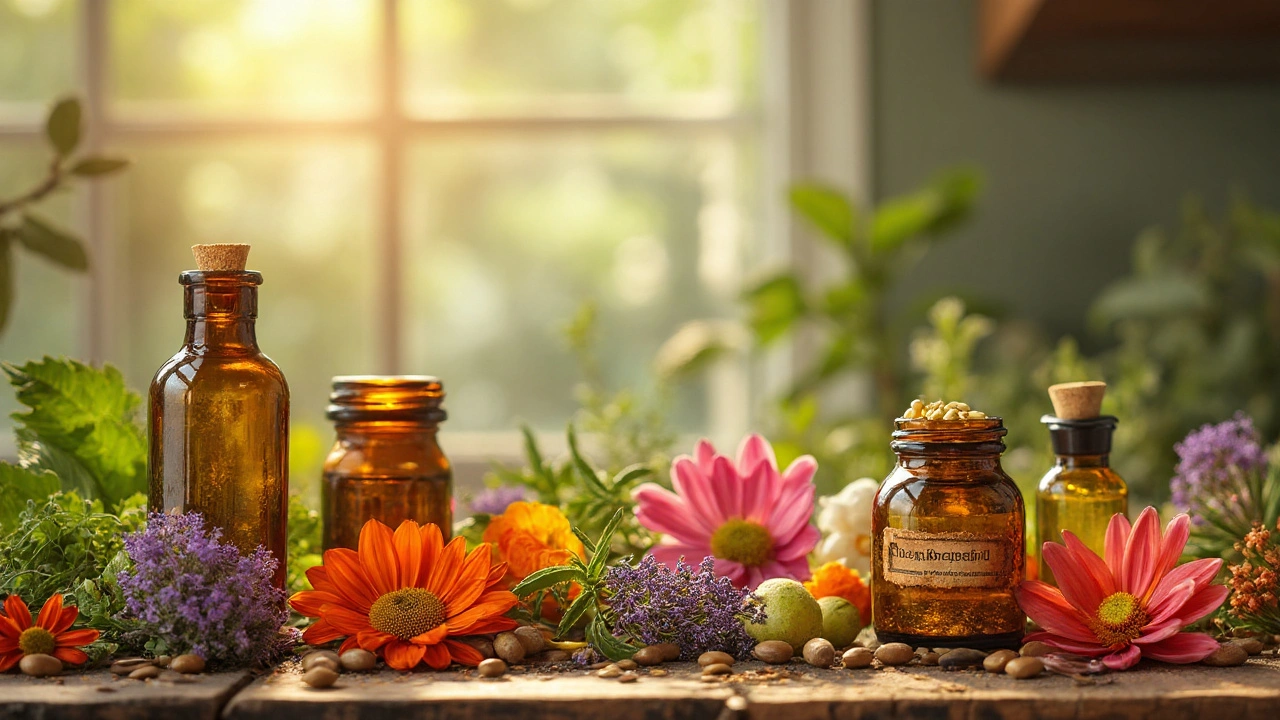Ever heard of a supplement promising more energy and a boost in the bedroom, all from ancient herbs? Tentex Royal is one of those names that gets tossed around in hushed conversations and Google searches alike. People always seem to be on the hunt for something that will keep them going, fighting stress, and supporting their bodies—preferably all at once. Here in Birmingham, you might catch a chat about it over tea, and you’ll spot it in local chemists, often in the 'natural remedies' aisle. Yet, is Tentex Royal all hype, or does it bring something real to the table? And is it actually safe? Let’s get real about what this herbal blend claims to achieve, who should use caution, and what the science really says.
What Exactly Is Tentex Royal?
Tentex Royal is an herbal supplement mainly known for supporting male sexual health, but the marketing stretches further. Marketed as a 'natural aphrodisiac', it claims to support energy, help reduce stress, and even improve overall wellness. While popular in some parts of Europe and Asia, it’s actually rooted in Indian Ayurvedic medicine, which is centuries old. The manufacturer, Himalaya Herbal Healthcare, has built its reputation around combining plant-based remedies with traditional formulations. Tentex Royal is available in capsule form, typically sold as a box of 10 or 20.
The real star here is the blend of herbs. The primary ingredients include:
- Tribulus terrestris: Said to support healthy testosterone levels and boost stamina.
- Hygrophila auriculata: Traditionally used for energy and sexual vitality.
- Mucuna pruriens: Known for its role in dopamine production and possibly mood enhancement.
- Argyreia speciosa: Sometimes linked to reproductive health.
- Lepidium sativum (cress): Thought to enhance libido, though real proof is slim.
- Orchis mascula: Used in herbal medicine for its supposed aphrodisiac properties.
If you’re scanning the back of the box, you’ll find no artificial chemicals or synthetic boosters—at least, according to the label. It all sounds airy-fairy, but people do report feeling more energetic. Whether that’s placebo or not is up for debate, but let’s not scoff just yet. Ayurveda has its roots deep in tried-and-tested tradition.
How Does Tentex Royal Claim to Work?
Manufacturers say Tentex Royal works by improving blood flow, reducing stress, and enhancing so-called 'Male Energy'—code for sexual stamina and performance. Some users believe the supplement helps with mild erectile dysfunction, though it’s not a medicine the way Sildenafil (Viagra) is. The herbs in Tentex Royal are reputed to act as adaptogens, helping the body adapt to stress and balance hormones. Tribulus terrestris, for instance, is often hyped up for its effects on testosterone, though the research is sketchy at best.
Let’s get one thing clear—this isn’t a quick-fix pill. Most people report needing a few weeks to start noticing any effects, while some feel no changes at all. Ayurveda, which is where this blend comes from, tends to look at wellness as a long-term goal instead of a fast result. It’s suggested you take one or two capsules once or twice daily, usually after meals. As with most supplements, you have to stay consistent—skipping days is a bit like going to the gym twice and expecting abs.
When it comes to libido and energy, there’s always a psychological component too. If you’re taking Tentex Royal alongside other healthy habits (think: more sleep, less stress, better nutrition), you’re more likely to notice a shift. But as far as testosterone and blood flow go, clinical trials are still in short supply—and smaller studies mostly focus on the individual herbs, not the formula as a whole. It’s best to treat it as a natural aid, not a miracle worker.

Science Talk: What Do We Actually Know?
Evidence for Tentex Royal's claimed benefits is a mixed bag. There’s a smattering of studies out there, mostly on the individual ingredients and not the combined product. For example, a small clinical trial in India back in 2009 suggested mild improvements in sexual stamina when men used combinations of Tribulus terrestris and Mucuna pruriens, but the sample size was tiny. Mucuna pruriens gets attention for its L-DOPA content, tied to dopamine and potential mood boosts. But when it comes down to this specific formula, there’s precious little gold-standard data—most results rely on anecdotal reports.
We can look at each herb’s track record in Ayurveda. Tribulus terrestris has been used for centuries as a so-called 'male tonic', though Western medicine doesn’t really buy in just yet. A 2017 review in the Journal of Dietary Supplements found little evidence that Tribulus alone improves erectile function in clinically significant ways, but it might be helpful for overall energy. Hygrophila auriculata, on the other hand, is less researched but regarded as an anti-inflammatory and vitality herb in Indian traditions.
Below you'll find a quick reference for individual ingredient effects, based on available (but limited) studies:
| Herb | Studied Benefits | Side Effects |
|---|---|---|
| Tribulus terrestris | May enhance libido, potential for increased energy | Possible upset stomach, mood swings |
| Mucuna pruriens | Potential increase in dopamine, stress reduction | Rarely: headache, insomnia |
| Hygrophila auriculata | Anti-inflammatory, mild energy boost | Limited data, mostly considered safe |
| Argyreia speciosa | Mood uplift, reproductive health | Very rare: nausea |
| Lepidium sativum | Libido boost (anecdotal) | Mild stomach upset if overused |
| Orchis mascula | Historically: aphrodisiac | Unknown |
When you compare Tentex Royal with a regular multivitamin, the unique blend supports those chasing old-school herbal approaches. But don’t expect it to perform like pharmaceutical-grade medicine. And, of course, supplements can’t make up for an unhealthy lifestyle, so you’ll get more out of it if you’re already taking care of your basics—sleep, a balanced diet, managing stress.
How Safe Is Tentex Royal? Tips for Use and Precautions
So it’s herbal and ancient—does that mean Tentex Royal is completely safe? Not necessarily. Herbal doesn’t always mean harmless, especially if you’re juggling other medications or chronic health conditions. The main concern is about possible interactions with heart medicines, diabetes meds, or blood-pressure tablets. For anyone taking regular prescriptions, it’s never a bad idea to double check with your pharmacist or GP. Pregnant people, breastfeeding mums, and anyone under 18 should avoid it altogether—testing just hasn’t been done.
Stick to the suggested dose: usually one or two capsules a day, swallowed with water after food. Don’t overdo it and think 'more = better', because herbs can have side effects if you take double or triple what’s recommended. Among the most common complaints are mild stomach upset and a bit more restlessness than usual. Rarely, some report headaches or trouble sleeping, especially if they’re sensitive to dopamine changes (think of the L-DOPA in Mucuna pruriens). It’s also worth noting that supplements aren’t checked as closely as medicines in the UK—so always buy from reputable pharmacies, not shady online shops.
Here’s a quick set of tips for anyone considering Tentex Royal:
- Always double check your medications for possible interactions.
- Avoid mixing Tentex Royal with alcohol or recreational drugs—your body has enough to process.
- If you have a history of hormone-sensitive conditions, such as prostate cancer, skip this supplement.
- Be patient—if you expect instant results, you’re setting yourself up for disappointment.
- If you experience unusual symptoms (skin rashes, palpitations, severe headaches), stop and contact a healthcare provider.
- Store it in a cool, dry place—herbs lose their potency if exposed to damp conditions.
And one last tip: if you plan to take Tentex Royal for longer than a few months, consider taking breaks every couple of weeks—Ayurvedic practitioners sometimes call this a 'herb holiday'. The body often needs to reset and avoid building up tolerance, especially to strong adaptogens or aphrodisiacs.

Life with Tentex Royal: What Real Users Say
Step outside the clinical trial bubble and you’ll find all sorts of stories from actual people. Some men say they feel a definite uptick in energy or mood within a week or two—and claim their partners have noticed, too. Others actually report better sleep and a sense of 'wellbeing', though the jury’s still out on how much is due to Tentex Royal versus better self-care habits. Interestingly, some users become loyal fans because it offers them a sort of structured, daily ritual—almost like taking a daily vitamin, but with a sprinkle of ancient wisdom tossed in.
Of course, not everyone shares glowing reviews. About one in five users, according to some online UK forums, feel absolutely no impact after using Tentex Royal as the box suggests. Others say they stopped after a week or two because of mild tummy upsets or restlessness. Women sometimes ask if this supplement helps them; so far, there’s little data—Tentex Royal was developed for male sexual health, though the stress-busting claims might suit others.
No product will suit every body. People with a history of anxiety say Tentex Royal can sometimes increase jittery feelings, especially if they’re sensitive to dopamine shifts. It’s rarely something dangerous—but as with any supplement, careful use is key. Listen to your body above all else. And although shops may suggest it as a confident energy booster, nobody should use it as a replacement for treating genuine health conditions. Address the root cause—whether it’s poor sleep, stress, or relationship troubles—first. Tentex Royal, if helpful, should only be one part of a bigger wellness approach.
So, does Tentex Royal deserve the buzz? If you’re looking for a gentle herbal assist and aren’t hoping for miraculous overnight change, it could be part of your toolkit. Just keep expectations realistic, talk to your doctor if needed, and never put supplements ahead of actual medical care. Still, in a world overflowing with chemical fixes, there’s a certain appeal to Tentex Royal and its backstory rooted in old-world tradition.

George Kata
August 13, 2025 AT 18:44Solid write-up — nice balance between traditional context and the cold hard science. I appreciate that the post didn't try to oversell Tentex Royal as a miracle pill; too many articles do that.
From my experience, these herbal combos are best treated as a mild assist: you might notice mood shifts or tiny energy changes if you do the other stuff right (sleep, diet, less booze). Also, check interactions if you're on meds — particularly blood pressure or antidepressants.
Not a hard endorsement, but I wouldn't lump it with snake oil either.
Mitali Haldankar
August 13, 2025 AT 22:31LOL people always want a magical fix — herbs or pills. 😂
But seriously, if it helps some folks feel less stressed and more confident, hey, that's something. Just don't expect fireworks the next morning.
Mike Privert
August 13, 2025 AT 23:31Totally agree — it's about the small wins. If Tentex Royal helps someone stick to a better routine or gives them a little mental boost, that's useful.
Also, try to track changes objectively: sleep, libido, mood — jot stuff down for a few weeks so you're not misattributing normal variance to the supplement.
snigdha rani
August 14, 2025 AT 21:33Okay, long-ish post incoming because this topic pops up a lot where I live and I want to be thorough.
First, Tentex Royal is basically a formulation rooted in Ayurvedic ideas and uses herbs that Indian practitioners have recommended for generations. That doesn't automatically validate every modern claim, but it does mean we have a long tradition to reference. In practice, the effects people report tend to fall into two buckets: subjective wellbeing (less stress, a small mood lift) and marginal sexual confidence. Those first-week-to-four-week stories often mix placebo with real small physiologic effects — for instance, Mucuna pruriens contains L-DOPA, which can affect dopamine, and dopamine affects motivation and mood. So if someone is feeling a bit brighter, part of it may literally be neurochemistry. But studies on Tribulus for testosterone and ED are underwhelming: some small trials show improvements in libido, but larger, better-controlled trials often show no significant clinical benefit.
Second, safety. Most people tolerate these herbs fine at recommended doses, but interactions are a real thing. Mucuna's L-DOPA can interact with MAO inhibitors and other meds affecting dopamine, and some herbs alter how your liver enzymes process drugs. That means if you're on blood-pressure meds, psychiatric meds, or diabetes drugs, you need to check with a pharmacist or doctor. Pregnant and breastfeeding people should avoid it entirely because those populations are rarely tested.
Third, dosing and expectations: these supplements are not like sildenafil — they don't act in an hour. Many users need 4–8 weeks of consistent use to notice anything, and even then changes are modest for a lot of folks. If you're taking it, keep up healthy habits: sleep, exercise, fewer late-night drinks. Also, don’t double-dose hoping for bigger results — that just raises the chance of side effects like stomach upset or insomnia.
Fourth, sourcing matters. Buy from reputable pharmacies or directly from the manufacturer in your country. Counterfeit supplements are a thing, and adulterated sexual enhancers have been found in shady products before. If the price is ridiculously low or it's sold on a sketchy site, skip it.
Finally, if someone wants to try it: try a short monitored course and track any changes. If you feel worse at any point — palpitations, severe headaches, rashes — stop immediately and get help. And remember, for clinically significant ED or low testosterone, speak with a clinician; herbs can be a complement but shouldn't replace evidence-based medical care.
Hope that covers most angles — happy to respond to questions about interactions or local availability.
Sriram Musk
August 15, 2025 AT 03:06Good points — in a few Indian pharmacies they also recommend short courses rather than continuous long-term use, which lines up with the 'herb holiday' idea mentioned in the post.
People here often cycle off after 6–8 weeks to avoid tolerance and see if they still notice a benefit.
Mitali Haldankar
August 15, 2025 AT 04:06Yes!!! The cycle thing is key, otherwise you just build tolerance and spend money for nada. 😅
Jeffery Reynolds
August 16, 2025 AT 01:20Joanne Clark
August 17, 2025 AT 05:06I found this article thoughtful, though a tad too forgiving of 'ancient wisdom' as if that automatically counts for empirical backing. Still, there's a sort of romanticism to these herbal labels that appeals to people who eschew modern pharmaceuticals.
I once tried similar herbal tonics and noticed a placebo lift — more ritual than pharmacology. I adopt a slightly elitist take: if you crave authenticity, get it from reputable sources and not from the bargain bin of internet marketplaces. Also, spelling aside, the packaging is often part of the appeal, which is marketing 101.
Finally, if it actually improves quality of life for some, who am I to sneer — but do not toss out conventional care if there's a real medical problem.
allison hill
August 17, 2025 AT 06:06Everything being sold as 'natural' releases people from responsibility to question efficacy, which is exactly the space where profiteers thrive.
Also, always check third-party testing — if something claims 'pure herbs' but provides no lab reports, that's a red flag.
Nick Moore
August 18, 2025 AT 08:53I've tried a similar Ayurvedic mix a while back. For me it was subtle but positive — less stress, a little more energy during the day. It helped me focus on better habits and that compounded into feeling better overall.
So I see these as nudge tools: they're not the solution, but they can nudge you towards the right routine if you let them.
Veronica Lucia
August 18, 2025 AT 09:53I like that phrasing — 'nudge tools'. There's a philosophical angle here: sometimes a ritual or small perceived enhancement can change behaviour patterns. When that happens, the downstream effects (sleep, mood, relationships) improve more than any single herb could produce alone.
So the supplement may be less important than the change it triggers in the person taking it.
Sriram Musk
August 24, 2025 AT 03:46If anyone's interested in buying, go to established pharmacies or the brand's official distributors. Avoid 'too good to be true' online sellers and check for batch numbers and expiry dates — they matter.
Also, local chemists sometimes provide small leaflets or advisories about interactions; ask them to be safe.
George Kata
September 12, 2025 AT 18:34Nice — buying smart matters just as much as whether the herbs work.
Thanks for the practical tip about checking batch numbers.